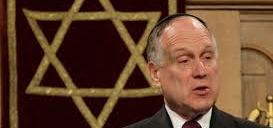Rabbi in Israel – War in Gaza

I am sitting in the National Library at the Hebrew University on the third day of a visit to Israel. I am in here to catch up with young people from my community who are studying at various institutions in Israel, but have dedicated today, the Fast of Tevet, to rest and to some private study. Yet instead, I feel motivated to write a short post about the atmosphere here. In the interests of brevity, here are a few points that have stuck in my mind:
* Every minyan I have visited is saying a ‘Kapitl Tehillim’ – a chapter of psalms – after each service, every day, followed by a prayer for the wellbeing of Jews everywhere. For your interest, so far I have been to a shteibl in Meah Shearim, the minyan of a prominent Chassidic Rebbe, a religious Zionist Shul and the minyan at the Hebrew University library.
* There is a hand-written note pinned to the door of the lift in the building where I am staying, advertising opportunities to send non-perishable food to soldiers in Gaza. Apparently, there are many such notices, as well as those volunteering to deliver the goods.
* I spoke yesterday to the head of a ‘hesder’ yeshivah; some of his students have been drafted and he is expecting most of the rest of the yeshivah to be called in the event of a prolonged or expanded conflict. This is the vision of the ‘hesder’ programme: enabling its students to combine Torah learning with military duty.
* I also spoke yesterday to a prominent so-called anti-Zionist rabbi who told me that he has encouraged his community to recognise what he called the ‘miracle’ in the south of Israel: the incredibly few casualties in the wake of 1000s of rocket attacks. He pointed out to me that while many in the Israeli media are observing that this is ‘abnormal’, that is insufficient – we must see the hand of God in this phenomenon.
* How meaningful the additional prayers for the fast day seemed this morning; the primary purpose of a fast day is introspection – I found this rather more manageable than usual. These selichot also contain texts that were, perhaps, easier to absorb than usual: references to the siege on the Holy Temple and our hopes that fast days will be transformed into moments of rejoicing.
* I was particularly startled by the word חמסנו – we have acted aggressively – which appears in the alphabetic confession said on fast days (every day in some communities). והמבין יבין.
I am impressed by the sense of calm and normality which seems to exist. Of course, for those with husbands or other family members in the IDF or who live close to the area of hostility, it must be a nerve-wracking time, yet Israelis have learned (sadly) to live normally, despite stress and uncertainty. But most of all, I am struck by the sense of unity and real care and fervent hope expressed by everyone here, of whatever stripe or allegiance within the religious community. I’m pleased that I’ve been here during this difficult time, as I’ve learned a lot of good things about Israelis and Israeli society.
May the hostilities end soon and the casualties be very few. May we also value the precious unity that this campaign has engendered and realise that it needn’t take a war…



I wish I could agree with your assessment of “calm”. The emails I’ve received from friends there don’t sound so calm. Kiryat Sefer and Ramat Beit Shemesh (among others) are absorbing families evacuated from the south. Altho’ these kids were living in relative calm, they now have new classmates who are sharing their stories of bomb shelters and rockets landing, and everyone’s having nightmares. The kids play “code red” that’s not a normal children’s game. Sorry to put this here, but I think in Jerusalem there’s a false sense of calmness that is just not felt elsewhere.
Aliza, if you think that Jerusalem is calm, I bet that Tel Aviv is sitting in the cafes drinking whatever latte or whatever they drink there and totally out of touch as usual. You can count on people with TV to be anesthetized. That’s how Oslo and Gush Katif were pulled off on the people of Israel.
Playing “code red” is a normal, healthy reaction to the situation. During the intifada the game I saw was throwing a ball and yelling, “pigua” (terrorist attack) – and all the kids running.
I am honoured to be able to pray for Israel, and I am sure that the Will of God will prevail.
Rachel